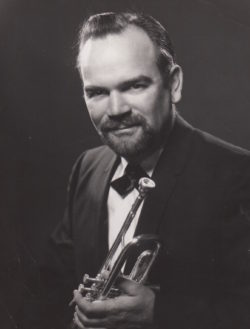
By Michael Swanger
The angel band gained a brilliant brass player and bandleader on Nov. 18, 2020, when Robert “Bob” Donald Weast passed away peacefully in Overland Park, Kansas, at age 91.
Whether you were an audience member who heard Bob play his trumpet with various jazz bands since World War II, or one of many young musicians he instructed, or an avid reader of Iowa History Journal who enjoyed his candid stories about his life as a jazz musician and bandleader, it is easy for anyone who crossed paths with Bob to imagine him now leading that angel band down by the riverside with his glorious horn and creative arrangements.

Bob Weast
Bob, who was born and raised in Wisconsin, was destined to be a jazz trumpeter. But he could not have imagined how far his horn would take him in life or the legacy he would create in Iowa when he first took up the instrument.
“Just before the Japanese bombed Pearl Harbor in 1941, my dad bought me the love of my life: a brand new $75 Elkhart trumpet,” Bob wrote for IHJ in his 2014 story, “High notes, low notes — Observations of a jazz musician on tour.” “I opened the case which unveiled a resplendent, sparkling, golden horn that was embedded in plush, purple velour. This was like a magical treasure chest opening my entire future. I was thrilled beyond measure.”
Three years later, the self-taught, 14-year-old trumpet player was hired by the musician’s union to join a band slated to perform for several months at a speakeasy in Germantown, Wis.
“The entrance had a one-way mirrored, buzzer-operated door that led to booze and gambling upstairs and dancing downstairs,” Bob wrote. “The speakeasy was my initiation to the professional world of playing music.”
In 1945, Bob hit the road with a 12-piece jazz band playing one nighters across the Midwest, earning $40 per week. The band crammed its members and gear into a rickety bus nicknamed the Blue Goose that was two Ford sedans welded together that Bob described as a “vastly underpowered hybrid rattletrap.”
“As teenagers, the hardships of endless travel weren’t minded at all,” wrote Bob. “Traveling 300 miles a day wasn’t unusual and we always ended up sleeping in a cheap hotel.”
Bob eventually got off the bus to earn degrees from the University of Wisconsin and University of Arizona, where he met his wife, Janice. After serving a stint in the U.S. Army, where he played USO shows with Raymond Burr, he moved to Des Moines in 1956. There, he began a 36-year tenure as professor of music at Drake University.
Bob’s greatest musical achievement, one could argue, was his creation of Drake’s jazz program. In 2017, he wrote for IHJ in his story, “‘Things ain’t what they used to be’ — How Drake University got into the jazz groove,” that, “In 1956, when I joined the faculty, Drake University was not ready for jazz.” That would change in 1969 after Bob’s proposal to offer jazz band as part of the elective curriculum with credit was approved by the faculty, though not everyone was initially onboard.
“One faculty member said he was concerned about the kind of students that might be attracted to Drake University, that they might not fit in,” Bob wrote.
The reaction from students to the creation of the first Drake Jazz Lab Band, however, was overwhelmingly positive.
“Students flocked to the tryouts and we had to create two bands, I and II,” wrote Bob, who in 1973 also co-founded Drake’s popular annual jazz festival that hosted legendary jazz musicians like Dizzy Gillespie, Buddy Rich, Stan Kenton and Maynard Ferguson.
Over the years, Bob would continue to perform with local and national Big Bands, jazz bands and entertainers like Doc Severinsen, Henry Mancini, Steve Allen and Red Skelton. In 1966, he traveled to Paris to study with renowned French trumpeter Maurice Andre. He was a member of the Des Moines Symphony Orchestra and fronted his own group, Bob Weast and His Swingin’ Big Band.
“The capping zenith of all was in 1979, playing a solo for Pope John Paul II at Living History Farms in Des Moines in front of an audience of 350,000 people,” Bob wrote in 2014. “After years of continuous playing … nothing can top that.”
In 2003, Bob earned the Drake University Medal of Service Award. In 2007, he was inducted into the Des Moines Jazz Hall of Fame by the Greater Des Moines Community Jazz Center.
But Bob was more than a musician and educator. He was a devoted family man, he raised bees and silk moths, and he wrote books including “Famous Trumpet Players,” “Keys To Natural Performance For Brass Players” and “Wild Silk Moths of the United States.” Bob and Janice, who died in 2018, set aside their Johnston property to the National Wildlife Federation, according to Bob’s obituary. They also donated their time, talent and proceeds from the sales of their CDs and honey to their church and various charities.
I am grateful to Bob for his contributions to IHJ and I will miss his storytelling and his humanity. When we would meet occasionally to have coffee to discuss story ideas, Bob’s kindness, humility and insatiable appetite for knowledge always inspired me. My heart goes out to his family. He will be missed.
TO READ MORE FASCINATING STORIES ABOUT IOWA HISTORY, subscribe to Iowa History Journal. You can also purchase back issues at the store.
